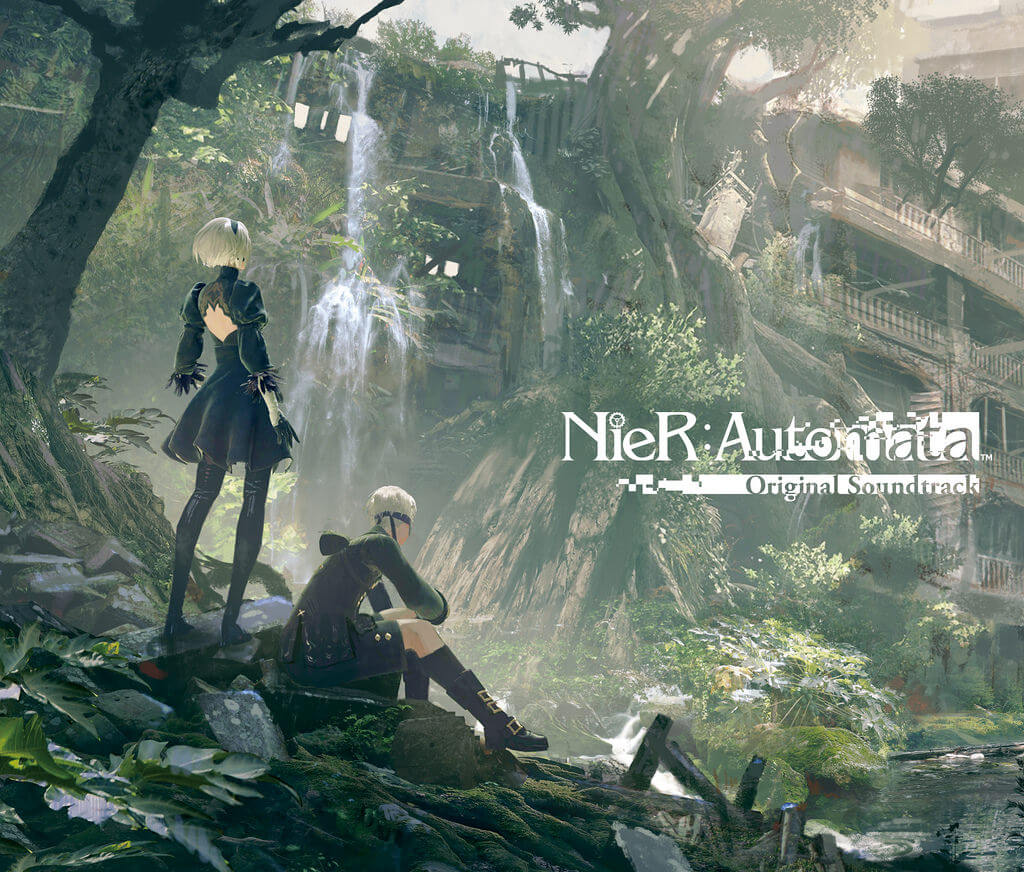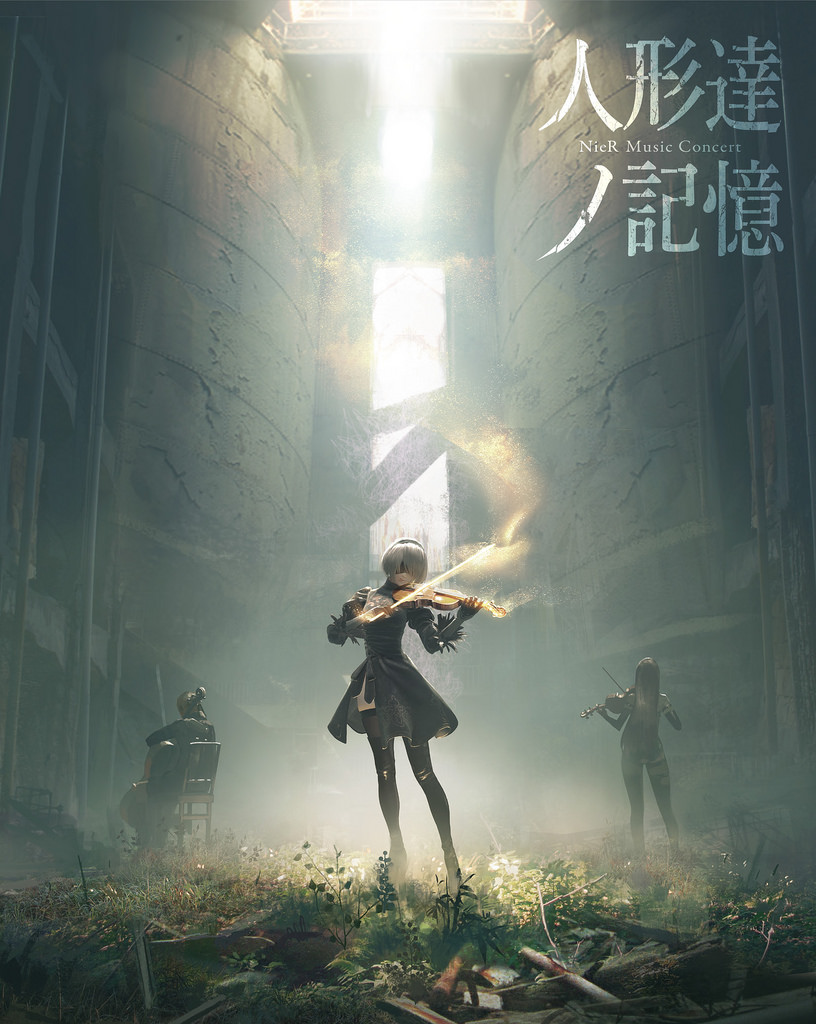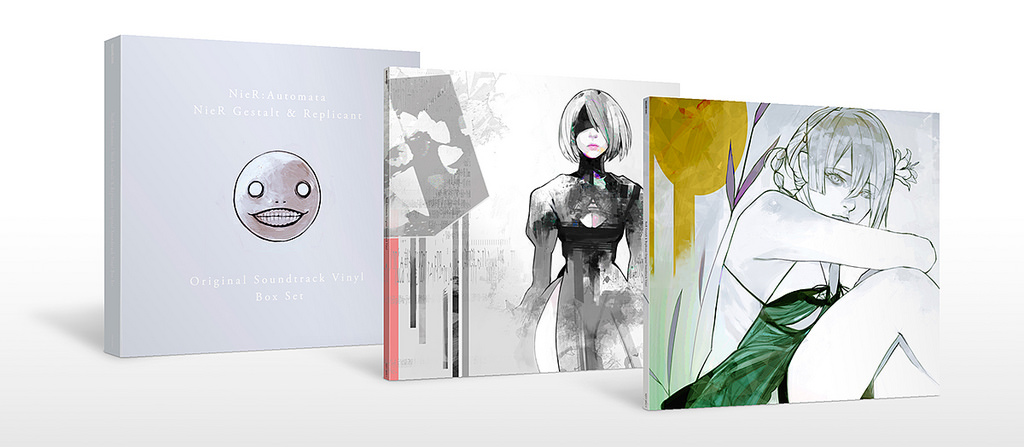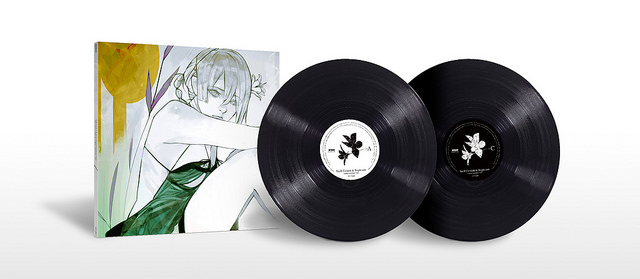Allow me to introduce myself. My name is Keiichi Okabe. I am the CEO of Monaca, Inc. and currently work as a composer of background music (“BGM”) of video games and various anime. I was in charge of the music direction and composition for Nier:Automata.
Generally, when I compose the BGM for a video game, the sound work is completed two to three months before the game goes on sale and I’m doing interviews and appearing at events around the time of launch. Then, within about a month, things pretty much come to a close.
However, with Nier:Automata, soon after we had completed the in-game portion work began on the original soundtrack (“OST”). Then, right after that, there was an event, called “The Memories of Puppets,” which was a combination of a concert and voice-over performance. After that, the vinyl version of the original soundtrack went on sale, the Arranged & Unreleased Tracks album released, and the theatrical stage show “YorHa” began… It was a constant stream of events and releases, so before I knew it a year had passed.
With previous titles I’ve worked on, the feeling was generally one of ‘when it goes on sale, my role is done,’ but with Nier:Automata, not only it is not done, it seems set to keep on going.
That being said, I’d like to go ahead and answer a few questions:
The original Nier game’s music was extremely well received, could you talk about how you wanted to continue that legacy to ensure that fans would not be disappointed with Nier:Automata?
The previous “Nier” was fantasy-like, and the story was fleeting and sad, so I composed the music to be mysterious, delicate, and ephemeral. Compared to that, Nier:Automata is much more sci-fi, so I tried to make the background music more dynamic. That being said, as a way to maintain the “Nier-ness,” I utilized “voice(s)” for each track, in order to create a melody that expressed that same sad and ephemeral feel. I really think the resulting fusion of dynamic music and mournful melody made for “Nier-esque music.”
What is the method by which you channel your ideas into the final products of your compositions?
First, I’ll think about the visuals and the situation, and then put my heart and soul into creating sounds that will make a given scene even richer. But the order in which I compose varies from song to song [laughs]. For battle music, where tempo is really important, I often start with the rhythm and go from there. With some songs, I follow a more typical track-making process, where specific instruments – for example a repeated string phrase – come first and I build on top of that. For songs that express emotions, I imagine someone singing, and I come up with a melody that I feel would be heart-rending and moving if sung. I compose the rest of the track around it to make that melody shine.
Do you have any funny stories about Yoko Taro and Yosuke Saito during the making of Nier:Automata?
Many of Director Yoko Taro’s requests come in the form of him just asking me to “make a song for this scene.” He does use my compositions as expected, but he also uses them in unexpected and often surprising ways. The song “Alien Manifestation” was requested to be written as song for one of the last stages. But when I started playing the very beginning of the game, as soon as you can control the character yourself, there it was. I was like, “Whaaaat? That song, here!?” I just laughed.
Producer Yosuke Saito never really said much to me about music while we were in production, just that he wanted me to include a rearranged version of a certain song from the previous “Nier” or other requests of that sort. If Yoko-san and I were okay with it, it was good with him.
Yoko-san is very particular as a creator, and isn’t easily influenced. I always think to myself that producers who employ him are so brave [laughs]. I found Saito-san’s handling of the reigns of the “rampaging Yoko Taro” to be really impressive. Maybe he’s just larger than life? Or he has lots of love and admiration for Yoko-san? I don’t know, but while the success of Nier:Automata is of course thanks to Yoko-san’s abilities, if Saito-san hadn’t been involved, I don’t think it would’ve come together. He’s someone that I truly respect. It’s not just flattery, I mean it! He’s larger than life [laughs].
What do you want fans to feel when they listen to your music?
I’m part of a generation that admired the music from North America and Europe while growing up. So when I first started composing, I was largely influenced by western music and would also try to mimic it. But the more I did that, the more I felt that my own style was very Japanese. I began to wonder what sort of music I could really make, and through trial and error, the music for the Nier series was born. I listened to wonderful music from the all over the world, internalized and absorbed it in my own way, and put my emotions into it in my own way, with my Japanese background. To be honest, I have no idea how the fans in the west feel when they listen to my music, but if they like it or find it moving, that makes me really happy.
After Nier:Automata released, how was the fan reaction? Was it stressful before the game came out? Are you relieved? Did you accomplish everything you wanted with the game’s soundtrack?
There was a quite lot of pressure, so it was a struggle to create. I would compose a bit, re-do it, and as that cycle repeated over and over, I started to run out of time. It was pretty chaotic towards the end [laughs]. So, I’m really glad that people liked it so much more than I had expected. To be honest, I was really surprised at being nominated for – and winning – several awards. I think that Nier:Automata is a really appealing game, and I believe that the gameplay experience really put the music in a more favorable light. There may be parts that didn’t quite reach perfection, but I think that it was because of who we are, here and now, that we were able to express a sort of “charm” that’s unique.
Lastly, to everyone who played Nier:Automata and everyone who listened to the soundtrack: thank you so much. I’ve been to a number of events in Japan where I’ve been able to see the fans’ reactions firsthand and communicate with them, but I’ve also seen the responses from the west online, and it makes me really happy. I dream of the day we can have an event in the west and I can see all of you in person. I’ll do my best to make that a reality, so please keep rooting for me!
Website: LINK







